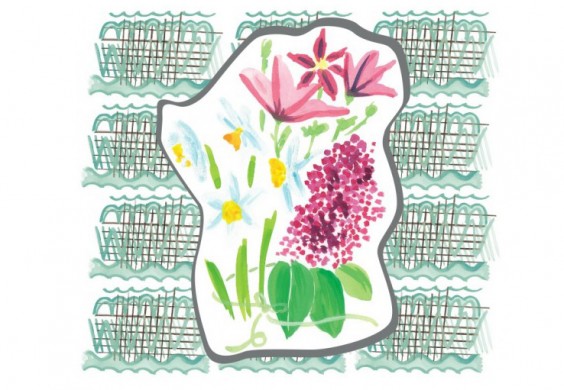
Por Raúl Gómez Jattin

Handling a bouquet produces a certain pleasure that begs—often shamelessly—for metaphor: Against your chest like a flag of virtue or snug in your bent elbow like a sleeping baby. Beyond the poetic imaginings of the deliverer, giving someone flowers is an act meant to convey a message.
FTD—the largest flora delivery network on the planet—encourages customers to “Say it with Flowers.” Judging from the company’s website, it is relegated to “Happy Birthday,” “Sympathy/Funeral,” “Congratulations,” and the like. The rose is the cardinal figure of FTD’s international flower dialect, but their vocabulary also includes tulips, lilies, and carnations—even a heart-shaped bamboo stalk.
Flowers are the vehicle to our emotional tenor, yet the modern bouquet and its compulsory card convey merely vague and sentimental messages that do not begin to reflect the subtleties of affections, let alone the words and poetry we might attach to each thorn, stem, or petal.
Roses infer warm affections; they do not say, “Your beauty exceeds that of these flowers.” As it turns out, that particular message requires a bouquet signifying #273: Germanium, Heliotrope, and Calceolaria.
The key is hidden within a forgotten Victorian novel published anonymously in 1836, The Floral Telegraph; or Affection’s Signals. The book has a gilded hardcover with flax-colored vines twirling about the corners and lengthwise down the spine; inside it contains a table of 120 flowers and a vocabulary with thousands of phrases. Together, the table of flowers and vocabulary allow floral telegraphers to transmit nuanced messages. In fact, the code, “a substitute for the dangerous use of the pen,” according to its inventor, does not only promise to say it with flowers, but to say anything with them.
For instance, #108 conveys, “To your beauty I surrender myself.” The phrase is signified by combining a flower that corresponds to the digit 1, narcissus 0, cypress, and 8, lavender. The three flowers are then tied by a silk thread with three knots before and after the flowers to direct the receiver to the third section of the vocabulary (both sender and receiver must have a copy of the book). When the bouquet is delivered, the recipient decodes the floral telegraph message.
While the tedious task of collecting, coding, and decoding flowers never caught on in the 19th century, the impulse toward flowers and other organic, ephemeral forms of communication may appeal to those 21st-century citizens worried about identity theft and secret surveillance programs. For me, the beauty of the floral telegraph is revealed in the way its grammar allows specific, touching phrases (e.g., #265: “How beautiful are your eyes!”) to be composed by seemingly banal specimens (daisy, fennel, larkspur).
These images, created by Aya Yamasaki, are contemporary illustrations of bouquets and phrases found in this rare, yet-to-be-digitized book.
Daniel Wuebben is an aficionado of power lines, clean waves, and Jorge Luis Borges. He holds a PhD in English from the City University of New York Graduate Center and teaches in the University of California Santa Barbara Writing Program.
Aya Yamasaki is a graphic designer and illustrator living in Los Angeles, California. She recently worked with Adult Contemporary, created a line of fabric jewelry for Homako, and released her own stationery line “Hello Ayasaki.” She can be found online at ayasaki.com.















click to see who
MAKE Magazine Publisher MAKE Literary Productions Managing Editor Chamandeep Bains Assistant Managing Editor and Web Editor Kenneth Guay Fiction Editor Kamilah Foreman Nonfiction Editor Jessica Anne Poetry Editor Joel Craig Intercambio Poetry Editor Daniel Borzutzky Intercambio Prose Editor Brenda Lozano Latin American Art Portfolio Editor Alejandro Almanza Pereda Reviews Editor Mark Molloy Portfolio Art Editor Sarah Kramer Creative Director Joshua Hauth, Hauthwares Webmaster Johnathan Crawford Proofreader/Copy Editor Sarah Kramer Associate Fiction Editors LC Fiore, Jim Kourlas, Kerstin Schaars Contributing Editors Kyle Beachy, Steffi Drewes, Katie Geha, Kathleen Rooney Social Media Coordinator Jennifer De Poorter
MAKE Literary Productions, NFP Co-directors, Sarah Dodson and Joel Craig